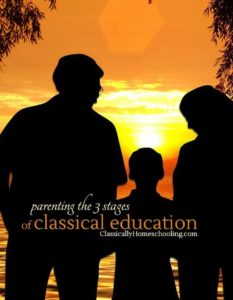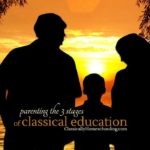Parenting the Three Stages of Classical Education
This post may contain affiliate links. For more information, please read my disclosure policy.
Parenting the Three Stages of Classical Education
Children pass through the three stages of classical education during the voyage from birth to adulthood. We’ve looked at the changes children make during these years, but have you considered how the parenting demands change as the children grow?
Physical Formative Parrot Years
First, we enter grammar years when children not only parrot everything they hear, they learn to hold spoons, to physically put a pencil to paper, and write. They’re learning to form letters, to master the letter sounds, to count, and to use scissors.
As a parent, these years are physically demanding. I’m picking up the children, guiding their hands while writing, helping them dress, tie shoes, and buckling them into car seats.
I help my grammar stage children learn facts and lay a foundation for future growth and studies. They go to the zoo, a museum, the library. They learn about atoms, pyramids, and animals. It’s an exciting time to parent the exploring, wondering child.
Emotional Logic Years
The dialectic stage is emotional for both the child and parent. The children are entering the puberty years and hormones are running strong. Emotions swing from one extreme to the next.
Dialectic children have to learn to control their emotions and balance them with logic. Too many emotional swings leave the children unable to critically think about the world. Prey to every advertisement they see. Too much logic leaves us with children unable to sympathize with the suffering. Unable to care about the weak.
So we concentrate on teaching logic and critical thinking to dialectic children, in the hopes they will think before they act. We encourage thoughtfulness and for our children to think beyond themselves and their own wants and needs to those of others. It’s a rewarding and emotionally demanding time.
Three Stages of Classical Education: The Rhetoric Years
Rhetoric teens no longer emote emotions everywhere. They ponder the world, consider their place within it, and debate ethical issues in the news.
We discuss the news, historical events, fantasy stories, and movies. Hours are spent pondering ethical concerns with friendships and relationships in books.

We wash dishes and talk. We drive and talk. And we clean and talk. No matter what we do, we talk. Discussion is central to the thoughtful years. For a parent, these discussions make it a mentally challenging time.
We can’t simply rest on our laurels, but we must learn as well, reading books and magazines such as National Geographic.
As the children progress from little mimics to contemplative young adults, the parenting demands change as well. Little grammar children demand physical hard work from us. Logic stage children are emotionally demanding, while the rhetoric teens are mentally challenging.
Have you experienced the changing needs as your children move through the three stages of classical education?
Recommended Reading:









Great post. I think of the levels of classical education in regards to school but hadn’t thought about how that applied to life and parenting. Very thought provoking.
It’s easy to think of classical education only in terms of school. I truly believe Dorothy Sayers had a deep understanding of child development when she wrote her speech The Lost Tools of Learning that launched the modern classical education movement. Thanks for dropping by! 🙂
Thank you for explaining the 3 stages! This was very helpful!
Thank you for stopping by the Thoughtful Spot Weekly Blog Hop this week. We hope to see you drop by our neck of the woods next week!
I love how you related the trivium to parenting. My (almost) 6yo son came in crying tonight (super over-tired from vacation) because he didn’t get a home run in baseball. He said that if he didn’t get one tonight he would never get one. He hasn’t hit the logic stage yet, lol.